News in 2019

|
2019 FIG Commission 7 Annual Meeting
5-9 August 2019, Seoul, Korea
An event to remember
The Annual Meeting of FIG Commission 7 was held in Seoul, Korea, for
5 days from August 5th to 9th. More than 100 people from 23 countries
participated in the event sharing their knowledge and experience in the
field of cadaster, land administration and geospatial information.
LX, the Korean public entity affiliated with the Ministry of Land,
Infrastructure and Transport (MoLIT), organized the 2019 Commission’s
Annual Meeting in Seoul (Korea). LX’s main functions include land
surveying, and administration of geospatial information, global
projects, research and education.
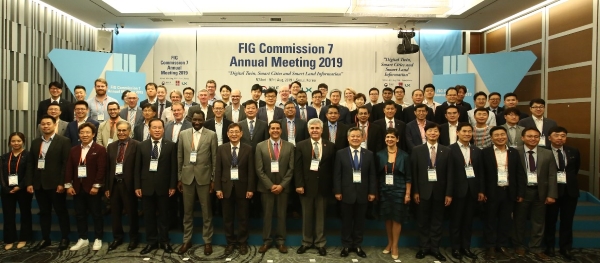
The Annual Meeting was impeccably organized, and every need of
participants was met with the generous and warm hosting spirit of the
Koreans. The result was an outstanding annual meeting with high-quality
technical presentations, great friendly discussions and a lot of
camaraderie among Commission 7 delegates.
During the meeting, we had the honour of the active participation of
high-level members of LX, and also Mr Oumar Sylla (GLTN Unit Leader at
the United Nations), Dr Orhan Ercan (Vice president of FIG) and Ms
Evamaria Uribe (National Director of the Cadastre and Mapping Agency of
Colombia, IGAC).

An active program full of productive discussions
The Annual Meeting was composed of 2 days of seminars, 1 day to visit
the Smart Geospatial Expo, 1 day for the annual meeting and the last day
with a technical tour.
Day 1 started with the welcoming speeches from FIG
Commission 7 Chair Daniel Paez, FIG Vice President Orhan Ercan, Director
General of MoLIT Woo-Jun Sohn, CEO of LX Chang-hak Choi, and UN-GLTN
leader Oumar Sylla. Then came an introduction of Korean Cadaster
followed by the sharing of surveyor experiences from Korea, Australia,
Netherlands, Canada, New Zealand, Sweden, Russia, among others. To
finish the first day, there was a welcoming dinner with a Korean
percussion performance, NANTA.
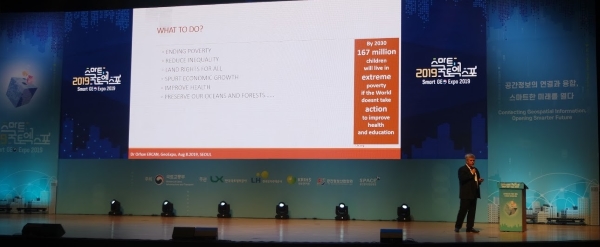
Day 2 was the main seminar with 17 presentations
distributed in 3 sessions: (Session 1) Smart City and Digital Twin,
(Session 2) Cadaster and Land Administration, and (Session 3) Cadaster
4.0. Through the seminar, we shared current contexts, challenges and
methodologies in the sector of Smart Cities, Digital Twin, Land
Administration, Land Information, Land Registration, Fit-for-Purpose,
and PPP, among others.
In Day 3, all the FIG participants moved to the
Smart Geospatial Expo 2019 at COEX, Seoul, to see the current
technologies Korea is promoting to improve and develop the geospatial
industry and create an environment where all countries can share their
knowledge and experience for future cooperation and projects. The
participation of FIG members to the Expo was a good opportunity to share
the role of the FIG and surveyors more generally with other countries,
and to emphasize the importance of cadaster and land management.
Day 4 involved country reports from Turkey,
Colombia, Netherlands, New Zealand, Thailand, Germany and so on, to
enhance understanding of local situations in specific countries and how
they compare to one another.
On the last day the participants had a technical tour to the DMZ
(Demilitarized Zone) to experience the history and the current situation
of the divided two Koreas.
Take-home messages
During the Annual Meeting in Korea, a very informative seminar was
held on key challenges and opportunities in land administration with
vivid discussions during reports presented by countries. This was
possible thanks to the passion and support of FIG members and all event
participants.
Urbanization is accelerating and expanding around the world; it is
important to improve technology to manage geospatial information, so our
“smart cities” are platforms that include policies, institutions,
technology and services that improve productivity and living standards
for all. Ideally geospatial technologies will increase service access
and productivity in rural areas. In urban areas, geospatial technologies
such as Digital Twin can protect local environmental and aesthetic
values.
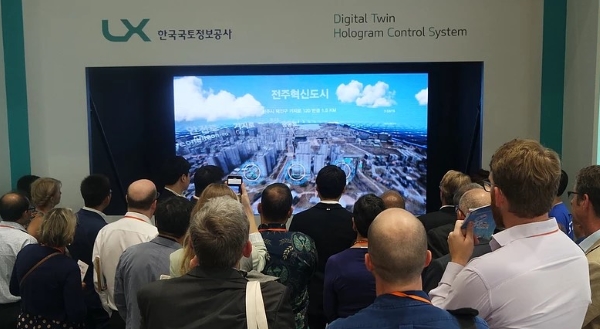 During
the meeting, I was pleased to see Korean LX taking a leadership role in
developing and implementing the concept of a Digital Twin involving both
digital and physical infrastructure to improve livability in rural and
urban areas.
During
the meeting, I was pleased to see Korean LX taking a leadership role in
developing and implementing the concept of a Digital Twin involving both
digital and physical infrastructure to improve livability in rural and
urban areas.
As Commission Chair, I am pleased that we are maintaining our role as
a discussion platform for ideas, technologies, trends and challenges.
SDGs are the Commission’s compass and key concepts of interest to the
Commission are Fit-for-Purpose land administration, and Public-Private
Partnership (PPP) combined with up-to-date technologies.
Our message that land tenure improvement is needed and these
improvements are a powerful vehicle to achieve many SDGs is getting to
decision-makers around the world. However, FIG Commission 7 cannot slow
down. We need to keep finding solutions to land problems and accelerate
their implementation. We cannot ignore that millions of people living in
poverty and affected by the impacts of the climate crisis need our help.
To learn more about the developments at the FIG Commission 7 Annual
Meeting, Dr Rohan Bennet did a wonderful Wrap-Up that you can watch in
the following video clip:
https://www.youtube.com/watch?v=6NgNgUHnYRs&t
Please visit the event website for the presentations and pictures
taken during the event.
https://www.com7figseoul.com/
Our next meeting will be in FIG 2020 Working Week in Amsterdam:
www.fig.net/fig2020
and then our 2020 annual meeting later in Switzerland (events not to
miss!).
Daniel Paez, PhD
Chair FIG Commission 7
3 September 2019




























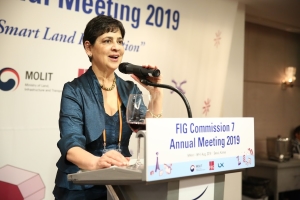
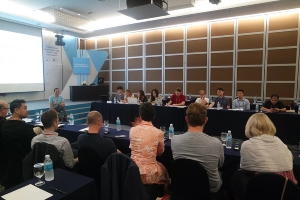
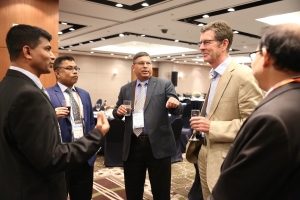

 During
the meeting, I was pleased to see Korean LX taking a leadership role in
developing and implementing the concept of a Digital Twin involving both
digital and physical infrastructure to improve livability in rural and
urban areas.
During
the meeting, I was pleased to see Korean LX taking a leadership role in
developing and implementing the concept of a Digital Twin involving both
digital and physical infrastructure to improve livability in rural and
urban areas.